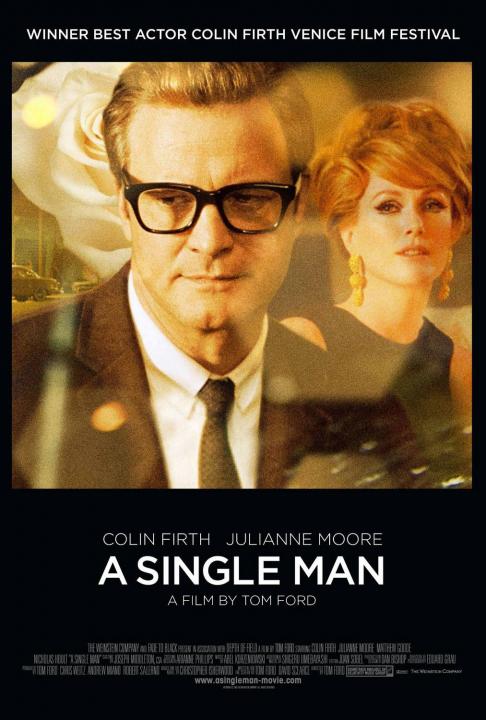Status: In limited release (opened 12/11/09)
Directed By: Tom Ford
Written By: Tom Ford
Cinematographer: Eduard Grau
Starring: Colin Firth, Julianne Moore
You wouldn’t know it from the cheesy romantic comedies he usually appears in, but Colin Firth is a terrific actor. Particularly to American audiences, he tends to be billed as a Hugh Grant type—a snarky, handsome Brit who the leading lady can’t help but fall for—but in A Single Man, he gets a chance to show his real range, and he takes full advantage of the opportunity. It’s nearly a one-man show, and Firth completely commands the audience’s attention throughout.
The film takes place in the 1960s, and Firth’s character, George, is an affluent college professor who happens to be homosexual. As the story opens, we learn that he has recently lost his long-time partner in a car crash, and his attempts to cope with this loss form the crux of the film’s arc. His flimsy support system consists of his neighbors (Ginnifer Goodwin among them), with whom he has a casual yet uneasy relationship, and his long-time friend Charley (the always-great Julianne Moore). The majority of his coping is done in private, though, and it’s really amazing how much Firth conveys with little more than changing facial expressions and subtly-delivered dialogue.
A Single Man is based on a book by Christopher Isherwood, which Wikipedia tells me was considered “one of the first and best novels of the modern Gay Liberation movement.” Tom Ford, who’s apparently some sort of fashion designer, adapted it into a screenplay, and also produced and directed the movie. It’s an impressive debut into the film world. Keeping the story set in the 60s gives it a bit of distance from the current politicization of gay rights in our own times, and yet the movie still rings as relevant. In a time before gay marriage had even been a consideration, much less a publicly-debated issue, George had about as close as he could come to it in Jim (Matthew Goode), his lover of 16 years. As the story here takes place after Jim’s tragic death, George’s memories of him are often idealized—and what a great piece of casting to have Watchmen‘s Ozymandias, supposedly a perfect physical specimen, embody these memories.
Ford’s adaptation does an artful job of conveying George’s troubled emotions, though he does get a little carried away at times. There’s a water metaphor that is repeated throughout the film, and it’s mostly effective until it’s used one time too many. More subtle—and more effective—is Eduard Grau’s cinematography, which matches and complements George’s changing moods admirably, most notably by increasingly washing out the color saturation of the film as George contemplates and gets closer to suicide, and in contrast by turning everything bright and vibrant when he decides that he wants to live. There’re similar effects employed to help distinguish between George’s painful memories (bland and dim) with the times when he’s happy in the present (bright and colorful), such as in a pivotal scene with Charley where they reflect upon their lives and their failed attempts at finding happiness. The most effective device Ford uses, though, is to depict gays in general, and George in particular, as invisible, going not only disrespected but flat out unnoticed by their fellow citizens.
All of this works because of Firth’s performance, which runs the gamut of the emotional spectrum and conveys not just conflicted feelings and inner turmoil but a full realization of a human being with whom we can empathize. Following my above description of the film you might not believe me if I told you it was uplifting and joyful at times, but it is, and these moments counterpoint those of despair and gloom effectively. I think my favorite scene, though, was a pained phone call, where Firth tells his character’s entire story without uttering a word. It’s moving and difficult to sit through, so strong is its impact. Firth has been nominated for an Oscar for this role, and it’s quite well-deserved. More than just a showpiece for this performance, though—great and impressive though it is—A Single Man is a resonant tale told by a filmmaker on a mission to engage his audience while getting his point across, and Tom Ford does so quite effectively. This is one of those small movies that may be hard to find in your local listings, but it’s worth making the effort to seek it out.




